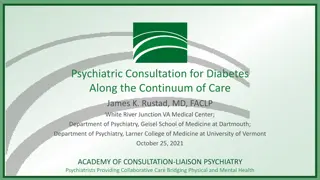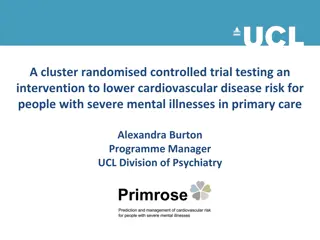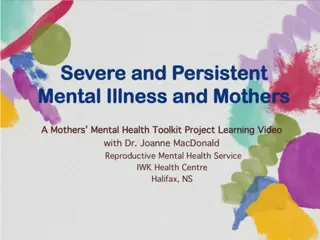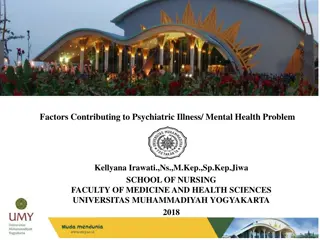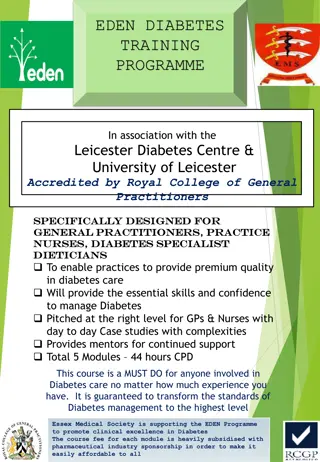Managing Physical Health in Severe Mental Illness with a Focus on Diabetes
This educational material presents a comprehensive slide set designed to aid in the management of physical health in individuals with severe mental illness, focusing on diabetes. It includes insights on the challenges faced by healthcare professionals, learning objectives on diabetes management, and a case study of an imaginary patient named Amir. The material highlights the importance of recognizing the prevalence of clinical diabetes among people with severe mental illness and emphasizes essential aspects such as lifestyle factors, communication within healthcare teams, and teamwork in primary care. The context sheds light on the significant impact of non-communicable diseases on individuals with severe mental illness, leading to premature mortality. The case study of Amir explores issues related to incomplete records and chaotic behavior, common among individuals with severe mental illness. Overall, the material serves as a valuable resource for discussions and educational sessions on improving the physical health care of individuals living with severe mental illness.
Download Presentation

Please find below an Image/Link to download the presentation.
The content on the website is provided AS IS for your information and personal use only. It may not be sold, licensed, or shared on other websites without obtaining consent from the author.If you encounter any issues during the download, it is possible that the publisher has removed the file from their server.
You are allowed to download the files provided on this website for personal or commercial use, subject to the condition that they are used lawfully. All files are the property of their respective owners.
The content on the website is provided AS IS for your information and personal use only. It may not be sold, licensed, or shared on other websites without obtaining consent from the author.
E N D
Presentation Transcript
Physical Health and People with a Severe Mental Illness Diabetes
Using this slide set This slide set is one of four, designed to be a teaching aid in the management of the physical health of people with a severe mental illness. The slide set should be used with the accompanying fact sheet on diabetes. The slide set is based on a consultation with Amir, an imaginary patient. Each slide set poses a separate set of clinical issues for the Family Doctor and their team. However, there is a chronology to the slide sets, and this slide set represents the first of four consultations with Amir. This slide set can be used in a small group setting, to prompt discussion on the care of people with a severe mental illness. The audience might be a primary care team of health care professionals, a joint meeting between mental health and primary care doctors, or a postgraduate educational meeting.
The Context 46% of people with a severe mental illness have a Non Communicable Disease (NCD) They die 15 20 years earlier than they would have done if they had not had a severe mental illness Causes of this premature mortality include: Genetics Deprivation Medication Lifestyle Health professionals attitudes
Learning Objectives Clinical Diabetes is more common amongst people with SMI The diagnosis of diabetes needs to avoid the use of HbA1c The management of diabetes is more complex Lifestyle factors are significant Organizational Communication with the mental health team is essential Sharing clinical information is essential Primary care teamwork is essential
Amir Clinical Background: Amir is a 38 year old man PMH: Schizophrenia diagnosed 22 years ago Nil else significant Family History: no information available Smoking History: not recorded Social History: no record of employment status Perusing his notes, he had numerous contacts with the practice nurse up until 5 months ago, and then nothing. The last few contacts were characterized by shouting, missing appointments, and generally chaotic behaviour
Amir Issues for the Clinician Incomplete records Behaviour towards the practice nurse and in the waiting room Fact Sheet People with severe mental illness lead chaotic lives Move frequently so that health records are frequently incomplete Are more likely to be unemployed Are more likely to need state benefits Are more likely to be homeless
Amir The Reason for the Consultation: During the consultation, Amir is quiet, polite and apologetic for his previous behaviour. He explains that he had become increasingly unwell mentally and had been admitted to hospital five months previously. His psychiatrist recently changed his medication to clozapine, and he feels much more settled and comfortable on this new treatment. He has been home for two weeks and noticed that he was much more tired than previously and was drinking all the time. He mentioned this to his psychiatrist, who recommended that he see his family doctor.
Amir Issues for the GP Address the presenting complaint or consider the mental health admission and discharge process? Fact Sheet People with SMI die 15 20 years earlier Cause of premature mortality is NCDs such as diabetes NCDs are more prevalent and more often poorly controlled Diabetes is at least 2 3 times more common in people with SMI
Amir Taking the History: The doctor focuses on the thirst and tiredness cardinal features of diabetes Family history: Both mother and father had Type 2 diabetes. His father died of a heart attack aged 55years. Amir s BMI has increased from 33 to 44 over the last two months He has also started smoking again (he had the opportunity to buy take-away meals and cigarettes as part of his rehabilitation programme whilst on the ward)
Amir Issues for the GP The diagnosis of diabetes is very likely He will need a fasting blood glucose to confirm the diagnosis An explanation of diabetes will be needed Life style counselling will be needed Will he need another consultation? Fact Sheet Using HbA1c to diagnose diabetes can provide a false negative result Antipsychotic medication is one contributing factor to the diabetes. Others include lifestyle, obesity, poor nutrition, and access to health care
Amir The next consultation with the Practice Nurse: A fasting blood glucose confirmed the diagnosis of diabetes New diabetic patient guidelines should be followed (country specific) Information is provided about diabetes Advice is provided about healthy eating, exercise and stopping smoking Advice about influenza vaccination, pneumonia vaccination, Hepatitis B vaccination Clinical examination to assess baseline of target organs Further blood tests to assess lipid profile etc.
Amir Issues for the GP If and when to start oral medication e.g. metformin Reassess cardiovascular risk Advice NOT to stop clozapine as a way to manage diabetes Communication with mental health team about new diagnosis Referral to dietician (when available) Fact Sheet All recommendations for new diabetics should be followed e.g. vaccinations etc. Accessing health care needs to be supported Communication with mental health team essential
Learning Objectives Clinical Diabetes is more common amongst people with SMI The diagnosis of diabetes needs to avoid the use of HbA1c The management of diabetes is more complex Lifestyle factors are significant Organizational Communication with the mental health team is essential Sharing clinical information is essential Primary care teamwork is essential
Quality Improvement: Can you identify How many patients with a severe mental illness are in your practice population? How many have had a diabetic assessment in the last 12 months?






